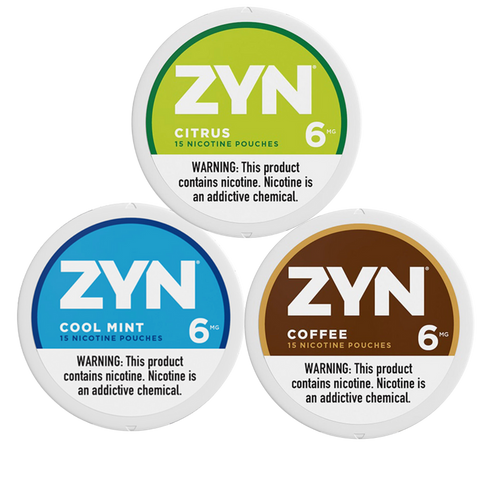
Why is Zyn taking off? Zynfluencers for Zyn Nicotine Pouches
Zyn News: Revolutionizing Nicotine Use Beyond Vaping
What's Zyn?
Zyn is a tobacco-free nicotine product that's gaining popularity in America. It's a small pouch you place under your lip to get a nicotine buzz without smoking. It's especially popular among people over 21 who already use nicotine.

Zyn as a Cultural Trend: Whats the Buzz about it?
Zyn has rapidly gained popularity, especially among Gen-Z consumers, marking its status as a new cultural phenomenon. Aimed at adults over 21 who already use nicotine, Zyn offers a smokeless, safer alternative. Despite Philip Morris's efforts to target adult users, the product's appeal to younger audiences has raised concerns and prompted calls for tighter regulations.
What is a Zynfluencer?
The rise of "Zynfluencers" — people who post about their Zyn pouch experiences on platforms like TikTok has grabbed attention and raised some eyebrows. With tiktok posts gathering millions of views, there's worry they might attract teens and young adults to try Zyn. Senate Majority Leader Chuck Schumer has expressed his worries, pushing for tighter control on Zyn and similar items, stating, "companies target young kids...using social media to draw them in."
While concerns about attracting a younger demographic are valid, it's important to note that the core audience of Zyn remains adults seeking a cleaner nicotine alternative. Senate Majority Leader Chuck Schumer's call for stricter oversight indeed points to the need for responsible marketing, which Zyn and Philip Morris International (PMI) take seriously.
Commitment to Responsible Marketing
PMI's response to the growing popularity of Zyn, particularly among online communities, is commendable. By not engaging influencers or featuring models under 35, Zyn sets a mature tone for its marketing efforts. The brand's adherence to strict age-gating on its website and proactive measures to flag inappropriate content demonstrate a steadfast commitment to marketing responsibly. Corey Henry's acknowledgment of the challenges in controlling internet content further highlights PMI's proactive stance in navigating the digital age's complexities while prioritizing adult consumers' interests.
Henry explains that Zyn doesn't work with influencers or feature models under 35 in their advertising. They also prevent anyone under 21 from visiting their website and report any social media content that shows Zyn being used by underage individuals or in a risky manner. However, he admits, "we can't oversee the entire internet." Despite platforms like TikTok banning content that promotes underage use of drugs, alcohol, or tobacco, Henry notes that some things still slip through the cracks.
Moreover, PMI's focus on adult tobacco users looking for alternative nicotine sources underscores Zyn's position as a product intended for those who are already familiar with nicotine. The fact that the average Zyn user is 39 years old and has previously engaged with tobacco products reinforces the brand's appeal to experienced nicotine users seeking better alternatives.
Navigating Regulatory Waters
The FDA's regulations require that non-tobacco nicotine products, like Zyn, be sold only to individuals over 21. The growing popularity of Zyn has led to scrutiny from figures like Senate Majority Leader Chuck Schumer, who has voiced concerns over its marketing strategies towards younger demographics. In response, Zyn has reiterated its commitment to responsible marketing aimed strictly at adults.
Market Dynamics and Industry Shifts
Despite facing regulatory hurdles, Zyn has performed exceptionally well in the market. This success prompted Philip Morris International to acquire Swedish Match, the maker of Zyn, signaling a strategic pivot towards smokeless nicotine solutions. This acquisition reflects an industry-wide shift from traditional smoking to alternative nicotine delivery methods.
Consumer Trends and Public Health Insights
Although Zyn is becoming more popular, its user base has not yet reached the widespread levels seen with vaping products like Juul. However, the sales of smokeless tobacco products, including Zyn, have seen significant growth. Public health experts have mixed views on nicotine pouches. While they are considered a less harmful option for adult nicotine users, there is concern over their potential to attract younger, non-nicotine users.
The Future for Zyn
As Zyn continues to grow in popularity, it stands at the forefront of shaping the future of nicotine consumption. The product's success hints at a potential shift towards a "smoke-free future." However, realizing this vision requires careful navigation of consumer needs, regulatory requirements, and public health considerations.
Philip Morris International's investment in Zyn and other smokeless products is a clear indicator of the changing landscape of nicotine consumption. As the industry moves towards offering safer, smoke-free alternatives, the goal is to provide options that could encourage smokers to transition away from traditional cigarettes. The path forward for Zyn and similar products involves balancing innovation with responsible marketing and adherence to health guidelines, ensuring a safe and accessible option for adult nicotine users.
Zyn's Rise in the Nicotine Market
Marketing Strategy by Philip Morris Philip Morris has taken a careful approach in marketing Zyn, avoiding influencers and targeting adults over 21. Their website restricts access to those of legal age, and flavors like cinnamon and peppermint are chosen to appeal to adults.
Explosive Growth Since its introduction in the U.S. in 2014, Zyn has seen remarkable sales growth, hitting $1.8 billion due to a significant increase in demand. This growth surprised even industry insiders, with Joseph Teller, a director for oral tobacco products, noting the unexpected success.
Promotion and Purpose Zyn is marketed as a discreet option for smokers, offering a "smoke-free" and "spit-free" solution that fits into busy lifestyles. But for Philip Morris’s goal of a smoke-free future to be realized, Zyn must not just supplement but replace cigarettes for users. Research from Ohio State University suggests that the transition from smoking to Zyn might not be seamless for all, especially due to differences in nicotine delivery speed.
Success Stories Individuals like Justin Wafer, who switched from smoking to Zyn, illustrate the potential benefits of Zyn. Wafer, who used to smoke a pack a day, found Zyn an effective alternative, appreciating its ease of use and taste over traditional nicotine replacement therapies like gum or lozenges.
Conclusion
Zyn’s journey reflects the changing landscape of nicotine consumption, with its strategy, growth, and user experiences indicating a shift towards smoke-free alternatives. As Philip Morris continues to navigate regulatory and market challenges, Zyn’s role in promoting a smoke-free future remains a subject of interest and optimism for many seeking safer nicotine options.
Author: Joshua Kim, Team Member of Eliquidstop
Hi there! I'm Joshua, and for the past five incredible years, I've been deeply involved in the world of vaping. Whether it's choosing the right vaping device, trying out exciting new e-liquid flavors, or keeping up with the latest trends in vaping, I'm here to offer my insights and help. Join me on this vaping journey, and let's explore the endless opportunities vaping has to offer.
References
https://time.com/6836195/zyn-nicotine-pouches-popularity/
https://www.cnn.com/2024/02/08/business/zyn-nicotine-pouches-sales-earnings/index.html
https://abcnews.go.com/Health/wireStory/zyn-nicotine-pouches-tiktok-sparking-debate-politicians-health-107707484

Leave a comment